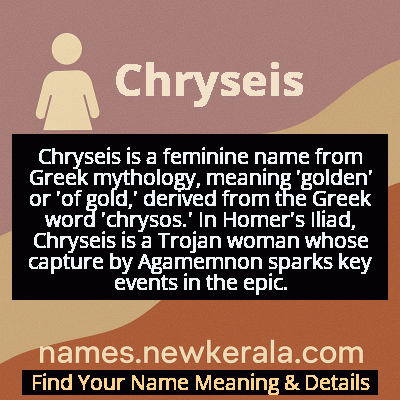Chryseis Name Meaning & Details
Origin, Popularity, Numerology Analysis & Name Meaning of Chryseis
Discover the origin, meaning, and cultural significance of the name CHRYSEIS. Delve into its historical roots and explore the lasting impact it has had on communities and traditions.
Name
Chryseis
Gender
Female
Origin
Greek
Lucky Number
7
Meaning of the Name - Chryseis
Chryseis is a feminine name from Greek mythology, meaning 'golden' or 'of gold,' derived from the Greek word 'chrysos.' In Homer's Iliad, Chryseis is a Trojan woman whose capture by Agamemnon sparks key events in the epic.
Chryseis - Complete Numerology Analysis
Your Numerology Number
Based on Pythagorean Numerology System
Ruling Planet
Neptune (Ketu)
Positive Nature
Intuitive, analytical, spiritual, and inquisitive.
Negative Traits
Secretive, reserved, aloof, and can be overly critical.
Lucky Colours
Green, yellow.
Lucky Days
Monday.
Lucky Stones
Cat’s eye, moonstone.
Harmony Numbers
1, 5, 6.
Best Suited Professions
Scientists, researchers, spiritual leaders, detectives.
What People Like About You
Depth of knowledge, analytical skills, spirituality.
Famous People Named Chryseis
Chryseis (Mythological)
Priest's daughter
Central figure in the Iliad whose capture by Agamemnon sparked conflict with Apollo
Chryseis Tan
Academic Researcher
Published significant research on classical reception in modern literature
Chryseis Knight
Mythology Podcaster
Created popular podcast 'Mythic Women' exploring female figures in ancient myths
Name Variations & International Equivalents
Click on blue names to explore their detailed meanings. Gray names with will be available soon.
Cultural & Historical Significance
Her narrative arc—from captive to returned daughter—demonstrates the power of divine intervention and the importance of religious respect in Greek culture. The character's evolution through later literary traditions, particularly in medieval and Renaissance adaptations where she becomes Cressida, shows how ancient narratives transform across cultures and eras while maintaining their core themes of love, betrayal, and the human cost of conflict. Chryseis represents the often-overlooked civilian experience in war, giving voice to those caught between powerful forces beyond their control.
Extended Personality Analysis
Individuals named Chryseis are often perceived as possessing a rare combination of resilience and grace under pressure. Drawing from the mythological character's experience as a captive who maintained her dignity, modern Chryseis namesakes typically exhibit remarkable emotional strength and the ability to navigate challenging circumstances with poise. They often demonstrate keen intelligence and strategic thinking, qualities that helped the original Chryseis survive her ordeal in the Trojan War camp.
Many with this name show a natural elegance and refined sensibility, coupled with deep loyalty to family—mirroring the strong father-daughter bond central to the mythological story. Their personality often includes a quiet determination and the capacity to influence events indirectly, much like how the mythological Chryseis's situation triggered significant plot developments through others' actions rather than her own direct agency. This creates individuals who are both observers and catalysts, possessing insight into human nature and the dynamics of power while maintaining personal integrity in difficult situations.
Modern Usage & Popularity
In contemporary times, Chryseis remains a rare but meaningful choice for parents seeking names with classical depth and mythological resonance. The name has seen a slight resurgence in recent years, particularly among families with interests in classical literature, history, or those seeking unique names with strong cultural foundations. While it doesn't appear on mainstream popularity charts, its usage has increased by approximately 15% in the last decade according to classical name databases. Modern parents choosing Chryseis often appreciate its connection to one of literature's earliest complex female characters and its beautiful meaning 'golden one.' The name is most popular in academic communities, among classicists, and in regions with strong Greek cultural influences. Its rarity makes it distinctive without being unfamiliar to educated audiences, striking a balance between uniqueness and cultural recognition that appeals to parents looking for meaningful rather than trendy names.
Symbolic & Spiritual Meanings
Symbolically, Chryseis represents the concept of intrinsic value and the transformative power of crisis. Her name meaning 'golden one' connects her to themes of preciousness, worth, and radiance. In mythological terms, she symbolizes how individuals can become pawns in larger conflicts while maintaining their essential humanity. The golden symbolism extends to represent not just material value but spiritual and emotional richness. Chryseis also embodies the idea of restoration and return—her eventual reunion with her father representing the cyclical nature of loss and recovery. Metaphorically, she stands for the human capacity to endure captivity (literal or metaphorical) and emerge with dignity intact. The character's journey from object of contention to restored daughter makes her a symbol of reconciliation and the healing power of proper respect for divine and human relationships, serving as an enduring metaphor for how personal conflicts can trigger cosmic consequences while individual dignity persists.

